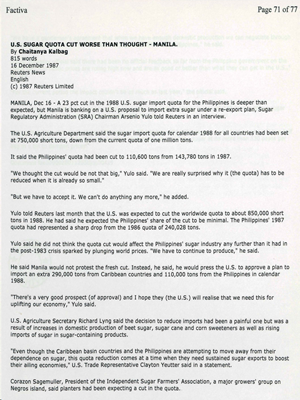U.S. SUGAR QUOTA CUT WORSE THAN THOUGHT – MANILA
[Reuters]
Published date: 16th Dec 1987
16 December 1987
Reuters News
English
(c) 1987 Reuters Limited
MANILA, Dec 16 – A 23 pct cut in the 1988 U.S. sugar import quota for the Philippines is deeper than expected, but Manila is banking on a U.S. proposal to import extra sugar under a re-export plan, Sugar Regulatory Administration (SRA) Chairman Arsenio Yulo told Reuters in an interview. The U.S. Agriculture Department said the sugar import quota for calendar 1988 for all countries had been set at 750,000 short tons, down from the current quota of one million tons. It said the Philippines’ quota had been cut to 110,600 tons from 143,780 tons in 1987. “We thought the cut would be not that big,” Yulo said. “We are really surprised why it (the quota) has to be reduced when it is already so small.” “But we have to accept it. We can’t do anything any more,” he added. Yulo told Reuters last month that the U.S. was expected to cut the worldwide quota to about 850,000 short tons in 1988. He had said he expected the Philippines” share of the cut to be minimal. The Philippines’ 1987 quota had represented a sharp drop from the 1986 quota of 240,028 tons. Yulo said he did not think the quota cut would affect the Philippines’ sugar Industry any further than it had in the post-1983 crisis sparked by plunging world prices. “We have to continue to produce,” he said. He said Manila would not protest the fresh cut. Instead, he said, he would press the U.S. to approve a plan import an extra 290,000 tons from Caribbean countries and 110,000 tons from the Philippines in calendar 1988. “There’s a very good prospect (of approval) and I hope they (the U.S.) will realise that we need this for uplifting our economy,” Yulo said. U.S. Agriculture Secretary Richard Lyng said the decision to reduce imports had been a painful one but was result of increases in domestic production of beet sugar, sugar cane and corn sweeteners as well as rising Imports of sugar In sugar-containing products. “Even though the Caribbean basin countries and the Philippines are attempting to move away from their dependence on sugar, this quota reduction comes at a time when they need sustained sugar exports to boos their ailing economies,” U.S. Trade Representative Clayton Yeutter said in a statement. Corazon Sage muller, President of the Independent Sugar Farmers’ Association, a major growers’ group on Negros island, said planters had been expecting a cut in the quota. “If the U.S. quota is not expanded there will be no incentive for planters to increase hectarage,” she said. she added, “With the reduction in the quota we will now be able to fill domestic demand and stop imports.” Last Friday the Philippines signed an agreement with four international traders to import 100,000 tonnes of sugar to meet a sudden shortfall in domestic supply caused by delayed milling and an unexpected surge in demand. Yulo said then that the first shipment of 36,000 tonnes of white sugar is expected to arrive from South Korea by December 21. An SRA official said the contract was signed after the traders — Marubeni Corp, Amerop Sugar Corp, Farr Man International Inc and Philipp Brothers Oceanic Inc — refused to take part in an earlier plan to borrow sugar from Thailand in a time-swap arrangement. Yulo said today that the balance 64,000 tonnes of raw sugar was scheduled for delivery around mid-1988 when another round of shortages in domestic supply was expected. Local planters have strongly protested the imports, the first ever in Philippine history, but Yulo said he preferred to call the transaction a “borrowing-import agreement.” “We have a gentleman’s agreement that when we have enough domestic production we can negotiate through the same traders so that they will buy the sugar back from the Philippines,” he said. A U.S. Embassy official said there had been no official feedback so far from the Philippine government on the quota cut. “Domestic prices are ruling high now and are as good or better than what they can get in the U.S ., ” he said. “For the current period the impact couldn’t be as much as last year,” the official said. Yulo said last week that the country’s stock inventory had dwindled to as low as 94,532 tonnes of raw sugar against preferred buffer stocks of at least 300,000 tonnes. Local prices have shot up to about 600 pesos per 50-kilo bag, SRA officials said. Local traders who will buy half the December imports of 36,000 tonnes have been enjoined to sell the sugar at no more than 520 pesos per bag in a bid to dampen prices.






